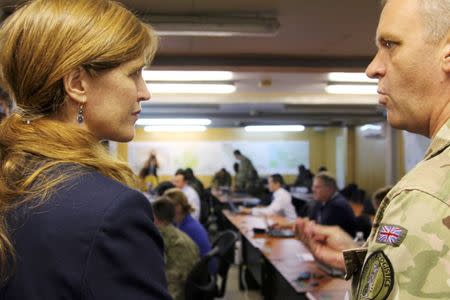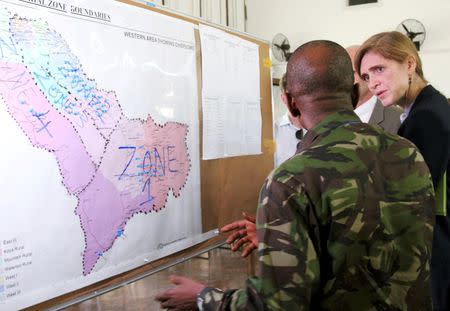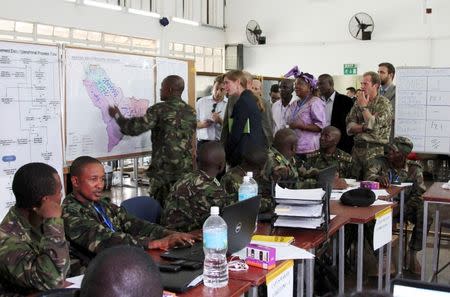Ebola health worker restrictions could deter others: U.S. envoy
By Michelle Nichols BRUSSELS (Reuters) - Some countries are yet to shoulder their share of the Ebola response burden and some restrictions on aid workers returning home from West African nations hit hardest by the disease could deter thousands from helping, Samantha Power, the U.S. envoy to the United Nations, said on Thursday. Power, after visiting Guinea, Sierra Leone and Liberia, where she and her delegation had no direct contact with Ebola patients, told the German Marshall Fund in Brussels: "This is a crisis that is so vast, with needs so great, with potential consequences so dire that no country can afford to stand on the sidelines. A few are doing a lot. But a lot are doing very little, or nothing at all." Power did not identify the countries she believes need to do more to help curb the deadly hemorrhagic fever that has killed about 5,000 people this year in the worst outbreak on record. Power said it was also important to remove the stigma in the affected countries and elsewhere that is associated with Ebola, which is spread through contact with bodily fluids of an infected person or the still-contagious body of someone who has died of the virus. Ebola survivors in West Africa have been shunned, while Australia has banned visas for citizens of the three countries. Several U.S. states, including New York where the U.N. has its headquarters, have imposed a mandatory quarantine on healthcare workers returning from the region. "Instead of knocking down the obstacles standing in the way of their service, some are choosing to put them up," Power said. "These kinds of restrictions could dissuade hundreds, if not thousands, of skilled volunteers from helping stop Ebola's spread, which is in the national interest of everyone of our countries," she said. Power has said she would abide by the law and does not expect to be quarantined when she arrives back in New York later on Thursday. A small number of Ebola cases have been reported in Nigeria, Senegal, Mali, Spain and the United States. 'WHERE WERE YOU?' Power said she saw some hope in the Ebola-stricken countries she visited. She said recently established command and control centers in the capitals of Liberia and Sierra Leone - bringing together the governments, the United Nations, foreign countries taking a lead in the response and aid groups - were proving successful. In Freetown in Sierra Leone, the rate of safe burials of the highly contagious bodies of Ebola victims within 24 hours had tripled in the few days a burial command center had been in operation, while in Liberia a mobile laboratory in a remote area had cut testing times from five days to five hours. "I did not go to Guinea, Sierra Leone and Liberia expecting to find much cause for hope. But today, the affected countries are in a very different place than they were six weeks ago. I came away more convinced than ever that if we rally the right response, together we can stop Ebola," Power said. The epidemic remains at a scale and severity the world has never seen before, Power told Reuters earlier on Thursday as she traveled to Brussels. "It will be something people talk about generations from now. There are these historical challenges that arise. Sometimes it’s the violence that one country commits against another, or atrocities against civilians. It could be a tsunami. Here it is the worst public health emergency in history," she said. "People will ask, 'Where were you when Ebola tried to wipe out communities in West Africa?'" (Reporting by Michelle Nichols; Editing by Grant McCool)



